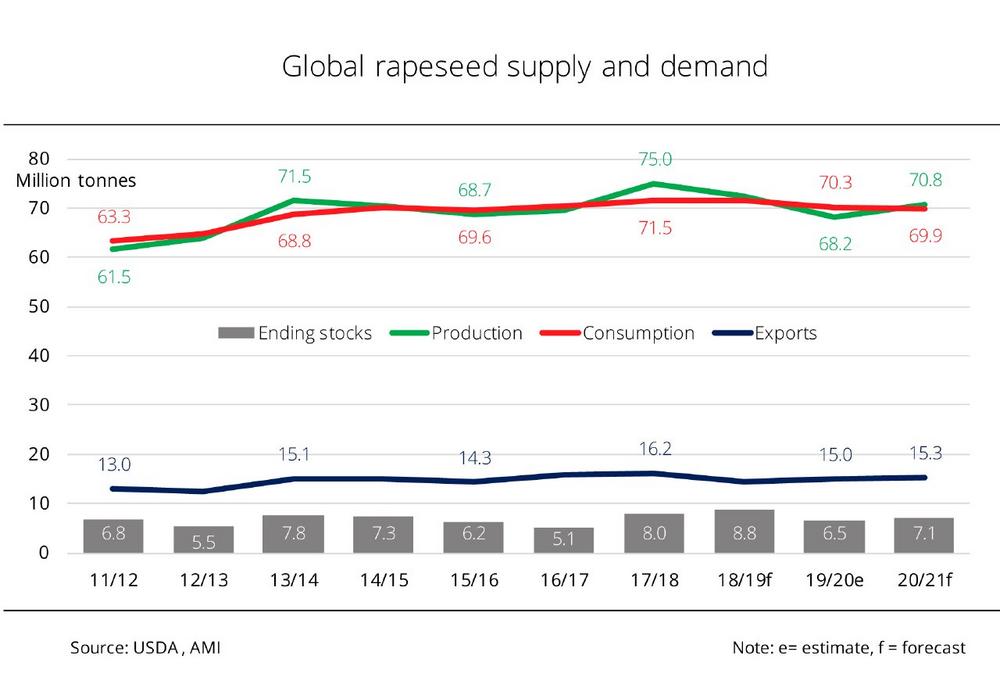In its most recent estimate, the USDA put global 2020/21 rapeseed production at 70.8 million tonnes, up 2.6 million tonnes from the previous year. Output is projected to rise in Australia, Ukraine and also Canada, whereas consumption is seen to decrease somewhat. The USDA anticipates demand to amount to 69.9 million tonnes. This would be down around 350,000 tonnes from 2019/20. According to investigations conducted by Agrarmarkt-Informations Gesellschaft (mbH), consumption is likely to fall particularly sharply in the EU-28*). The decline in demand in the EU-28 in the upcoming crop year is projected at 23.1 million tonnes, around 325,000 tonnes fewer than 2019/20. Due to the falloff in utilisation and global increase in production, output will probably exceed consumption. This last happened two years ago.
Exports will presumably rise 0.3 million tonnes to 15.3 million tonnes, with larger exports from Australia and Ukraine expected to offset smaller exports from Canada. According to the USDA, 2020/21 rapeseed ending stocks are expected to hit around 7.1 million tonnes. This would be a 0.6 million tonne rise compared to 2019/20. Canada is likely to see an especially sharp rise of 0.75 million tonnes to 3.9 million tonnes. This would more than offset the decline in stocks in China, the EU-28, India and Japan.
Rapeseed cultivation is a major feedstock contribution towards the "Farm to Fork" strategy
The Union zur Förderung von Oel- und Proteinpflanzen (UFOP) has pointed out that these rapeseed supplies are first and foremost used to cover feedstock demand for biodiesel production. More specifically, in 2018 the EU-28 used approximately 5.2 million tonnes of rapeseed oil to produce biodiesel fuel. This is the equivalent of approximately 13 million tonnes of rapeseed. Consequently, demand for biodiesel safeguards rapeseed production in Europe, the association has noted. However, the corresponding amount of rapeseed oil could at any time also be used to meet a growing demand for rapeseed oil for food uses, UFOP has emphasised. Moreover, the volume of approximately 8 million tonnes of GM-free rapeseed meal obtained in rapeseed processing reduces the demand for soybean imports from overseas and, consequently, the corresponding demand for land for soy production. UFOP has stressed that, all in all, rapeseed cultivation is an important contribution towards the "Farm to Fork" strategy the EU Commission presented last week.
*) Note: Despite Great Britain’s departure from the EU, the USDA continues to use the EU-28 as a reference point.
The Union for the Promotion of Oil and Protein Plants e. V. (UFOP) represents the political interests of companies, associations and institutions involved in the production, processing and marketing of domestic oil and protein plants in national and international bodies. UFOP supports research to optimise agricultural production and for the development of new recycling opportunities in the food, non-food and feed sectors. UFOP public relations aim to promote the marketing of domestic oil and protein plant end products.
UFOP – Union zur Förderung von Oel- und Proteinpflanzen e.V.
Claire-Waldoff-Str. 7
10117 Berlin
Telefon: +49 (30) 2359799-40
Telefax: +49 (30) 2359799-99
http://www.ufop.de
GF
Telefon: +49 (30) 31904434
E-Mail: s.arens@ufop.de
![]()

